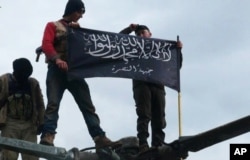The al-Qaida terror organization has released a new audio message from its elusive leader in which he slams the Syrian Jihadi group Liberation of the Levant Organization, or more commonly known as Hayat Tahrir al-Sham (HTS), for going after senior jihadists loyal to al-Qaida in Syria.
In the 35-minute undated audio video “So Let Us Fight Them With Solid Foundations,” Ayman al-Zawahiri denounced HTS’s decision to break off formal ties with al-Qaida last year and betray its oath of allegiance as the offshoot of the terror organization in Syria. VOA could not independently verify the video’s authenticity.
“Why did this love disappear among us and was replaced by roughness, conflict, cruelty of the heart, conspiracy to evade the oaths of allegiance, and the insubordination of the brothers and working to drive them out, curb them, and put them under captivity?” al-Zawahiri said, addressing HTS leaders in the message, which was published by al-Qaida’s media propaganda al-Sahab Foundation on Tuesday.
HTS, originally called al-Nusra Front, rebranded itself last year and later merged with several smaller rebel factions into a new alliance.
A report by the Institute for the Study of War last week claimed that the group has exploited the international community’s focus on annihilating the Islamic State to significantly increase its influence in southern Syria, consolidating control over most of the northwestern province of Idlib.
Al-Zawahiri said he did not approve the HTS departure from al-Qaida. He described as a “fatal mistake” offers by the HTS leaders to keep their loyalty to him secret in order to avoid a U.S.-led military campaign.
In August, Michael Ratney, the top U.S. State Department official in charge of Syria policy, said Nusra and its leaders would be targets for Washington even if they rebranded and adopted new names in an effort to escape U.S. and other countries’ military campaign against terrorism in the region.
Global jihad vs. nationalism
Al-Zawahiri suggested the HTS leaders were attempting to abandon global jihad and turn to a nationalist agenda. He denounced them for starting a campaign of rounding up senior al-Qaida leaders, particularly foreign fighters and their families, “to appease” the U.S.
“O brothers, we haven’t forced you, pressured you, threatened you with a sharp knife or a shattering bullet,” al-Zawahiri said while describing the desperate state of al-Qaida loyalists under the HTS. “If this is our situation, filled with fear and disturbance, during this critical phase, then what will we do to each other when we prevail?”
On Monday, Syrian local media reported that HTS started a large-scale arrest campaign against people with alleged ties to al-Qaida. A day later, HTS released a statement confirming the detention of several senior jihadists, including Sami al-Oraydi and Abu Juleibib al-Urduni, both of whom have been vocal in criticizing HTS for severing ties with al-Qaida.
HTS officials said detained jihadists were “leaders of dissension who were spreading specious arguments,” adding that they would be put before a Sharia court.
Increasing tensions
In a response statement, which surfaced Thursday on Telegram, a top HTS leader, Abdul Rahim Atun, defended the arrests as being focused only on those who meant harm for the Syrian Islamist group.
“We have not treated those who follow al-Qaida but with good,” Atun said, addressing al-Zawahiri. “But there must be a distinction between those who work for jihad, regardless of what group they are affiliated with, and those who seek to destroy the [HTS] in the name of loyalty to al-Qaida to vent their psychological crises.”
Atun said the HTS rebranding and break off from al-Qaida was not done to appeal to the West but was an attempt to reunite with local rebel groups and achieve efficiency in decision-making.
Experts charge the arrest campaign of the al-Qaida loyalists by HTS leadership and their public shaming by al-Zawahiri signals that the relationship between them has reached a point of no return.
“(Al-)Zawahiri said that he has been trying for more than a year to resolve the issue with HTS internally and privately, but this did not work out; so he had to call them out in public,” Hassan Hassan, a Middle East expert at Tahrir Institute in Washington, told VOA.
Hassan said the tensions show that al-Zawahiri is disappointed with the HTS and is pleading for his followers to possibly reorganize into a new group.
Hassan added the disengagement with al-Qaida has helped HTS gain more effectiveness in the Syrian war scene.
“Ayman al-Zawahiri is now hiding somewhere between Afghanistan and Pakistan, and he expects people to wait for his letters that usually take months to reach them. And then a response from them to reach al-Zawahiri will take other months. This will not work. These groups need to make day-to-day decisions,” Hassan added.
But their parting of ways will ultimately not spare HTS from being targeted by the U.S., Hassan emphasized.
“HTS will not be attacked now, although it will be dealt with eventually as a jihadist organization. The U.S. will not remove its designation as a terrorist group,” Hassan said.





